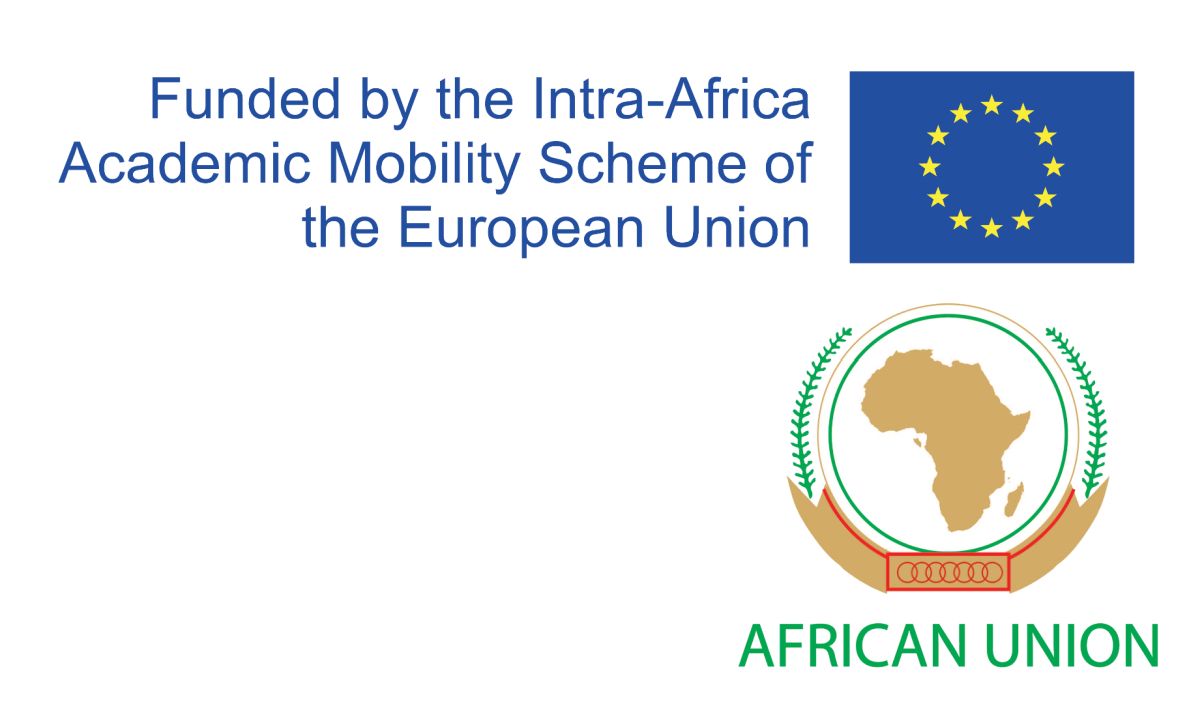
Course1: Doctor of Philosophy in Biochemistry
- Thematic field of study: Infectious diseases/Human genetics/Non-communicable diseases
- Duration (in semesters): 8 Semesters
Objective
The PhD in Biochemistry programme is designed to train highly skilled biochemists and equip them with the necessary skills contribute to cutting edge research and innovation aimed at guiding the development of new approaches to disease diagnosis, prevention, and control, nationally and in the sub-region.
Structure
The four-year programme covers two semesters of didactic coursework and three years of advanced research work. This programme is an intensive research and pedagogic training that covers methodology, rigorous evaluation of experimental results, and skills training in research administration, teaching, teamwork, organisation, and presentation. The coursework component of this programme includes core subjects such as Science and Society, Research Methodology & Scientific Communication, Advance Topics in Bioinformatics, Advanced Quantitative Research Methods and Special Topics in Science. Students will also have the option to select among a broad range of advanced topics in biochemistry including Advances in Biochemical Pharmacology and Toxicology, Advances in Molecular Biology and Applications, Advances in Natural Product Research, Advances in Biomedical and Infectious Diseases Research. Elective course includes Teaching Science at Tertiary Level. After successfully completing the coursework component of the programme, students are required to take a 3-part comprehensive examination comprising of a written examination, a written research proposal and an oral examination. On passing the comprehensive examination, the student begins work on a research project of interest. To be awarded a Doctor of Philosophy degree in Biochemistry, a student must have taken and passed between 18 to 24 credit hours of coursework, taken part in 12 credit hours of departmental seminars, and produced and successfully defended a thesis of original research work.
Course2: Doctor of Philosophy in Molecular Cell Biology of Infectious Diseases
- Thematic field of study: Infectious diseases/Human genetics/Non-communicable diseases
- Duration (in semesters): 8 Semesters
Objective
The PhD in Molecular Cell Biology of Infectious Diseases programme is designed to train highly skilled biochemists and equip them with the necessary skills contribute to cutting edge research and innovation aimed at guiding the development of new approaches to disease diagnosis, prevention, and control, nationally and in the sub-region.
Structure
The four-year programme covers two semesters of didactic coursework and three years of advanced research work. This programme is an intensive research and pedagogic training that covers methodology, rigorous evaluation of experimental results, and skills training in research administration, teaching, teamwork, organisation, and presentation. The coursework component of this programme includes core subjects such as Science and Society, Research Methodology & Scientific Communication, Advance Topics in Bioinformatics, Advanced Quantitative Research Methods and Special Topics in Science. Students will also have the option to select among a broad range of advanced topics in biochemistry including Advances in Biochemical Pharmacology and Toxicology, Advances in Molecular Biology and Applications, Advances in Natural Product Research, Advances in Biomedical and Infectious Diseases Research. Elective course includes Teaching Science at Tertiary Level. After successfully completing the coursework component of the programme, students are required to take a 3-part comprehensive examination comprising of a written examination, a written research proposal and an oral examination. On passing the comprehensive examination, the student begins work on a research project of interest. To be awarded a Doctor of Philosophy degree in Biochemistry, a student must have taken and passed between 18 to 24 credit hours of coursework, taken part in 12 credit hours of departmental seminars, and produced and successfully defended a thesis of original research work.
Course1: Master of Philosophy in Biochemistry
- Thematic field of study: Infectious diseases/Human genetics/Non-communicable diseases
- Duration (in semesters): Four (4)
Objectives
The MPhil in Biochemistry programme is designed to train and produce postgraduates in biochemistry with the necessary advanced knowledge to contribute to cutting-edge research and innovation aimed at guiding the development of new approaches to disease diagnosis, prevention, and control, nationally and in the sub-region.
Structure
The two-year programme covers two semesters of intensive coursework with written examinations at the end of each semister and another year dedicated to research work. The coursework component of this programme is intensive and targeted, covering a plethora of advanced topics in biochemistry and molecular biology. Core courses include Complex Biomolecules, Advanced Molecular Biology, Advanced Protein Chemistry, Experimental Techniques, Advanced Enzymology, Bioinformatics, Mitochondrial Biochemistry, Signal Transduction, and Research Methodology & Scientific Communication. Elective courses include Molecular Mechanisms of Development, Immune Response Mechanisms, Pesticide Biochemistry, Parasite Biochemistry & Antimicrobial Chemotherapy, Applications of Biotechnology, Eukaryotic Cell Biology, Biochemical Toxicology, and Secondary Metabolism & Natural Products. All students receive training in the field and laboratory methods used in modern research, empowering them both to understand the research literature and to contribute to new knowledge through research. Students who successfully complete the course work components of their Master’s programme work with a faculty mentor to define a research project of interest. They are required to complete an original research project for their dissertation and for publication in peer-reviewed journals. To be awarded a Master of Philosophy degree in Biochemistry, a candidate must have taken and passed 30 credit hours of coursework, taken part in 6 credit hours of departmental seminars, and produced and successfully defended a thesis of original research work.
Course2: Master of Philosophy in Molecular Biology
- Thematic field of study: Infectious diseases/Human genetics/Non-communicable diseases
- Duration (in semesters): Four (4)
Objectives
The MPhil in Molecular Biology programme is designed to train and produce postgraduates in biochemistry with the necessary advanced knowledge to contribute to cutting-edge research and innovation aimed at guiding the development of new approaches to disease diagnosis, prevention, and control, nationally and in the sub-region.
Structure
The two-year programme covers two semesters of intensive coursework with written examinations at the end of each semister and another year dedicated to research work. The coursework component of this programme is intensive and targeted, covering a plethora of advanced topics in biochemistry and molecular biology. Core courses include Complex Biomolecules, Advanced Molecular Biology, Advanced Protein Chemistry, Experimental Techniques, Advanced Enzymology, Bioinformatics, Mitochondrial Biochemistry, Signal Transduction, and Research Methodology & Scientific Communication. Elective courses include Molecular Mechanisms of Development, Immune Response Mechanisms, Pesticide Biochemistry, Parasite Biochemistry & Antimicrobial Chemotherapy, Applications of Biotechnology, Eukaryotic Cell Biology, Biochemical Toxicology, and Secondary Metabolism & Natural Products. All students receive training in the field and laboratory methods used in modern research, empowering them both to understand the research literature and to contribute to new knowledge through research. Students who successfully complete the course work components of their Master’s programme work with a faculty mentor to define a research project of interest. They are required to complete an original research project for their dissertation and for publication in peer-reviewed journals. To be awarded a Master of Philosophy degree in Biochemistry, a candidate must have taken and passed 30 credit hours of coursework, taken part in 6 credit hours of departmental seminars, and produced and successfully defended a thesis of original research work.
Course3: Master of Philosophy in Molecular Cell Biology of Infectious Diseases
- Thematic field of study: Infectious diseases/Human genetics/Non-communicable diseases
- Duration (in semesters): 9-12
Objectives
The MPhil in Molecular Cell Biology of Infectious Diseases programme is designed to train and produce postgraduates in biochemistry with the necessary advanced knowledge to contribute to cutting-edge research and innovation aimed at guiding the development of new approaches to disease diagnosis, prevention, and control, nationally and in the sub-region.
Structure
The two-year programme covers two semesters of intensive coursework with written examinations at the end of each semister and another year dedicated to research work. The coursework component of this programme is intensive and targeted, covering a plethora of advanced topics in biochemistry and molecular biology. Core courses include Complex Biomolecules, Advanced Molecular Biology, Advanced Protein Chemistry, Experimental Techniques, Advanced Enzymology, Bioinformatics, Mitochondrial Biochemistry, Signal Transduction, and Research Methodology & Scientific Communication. Elective courses include Molecular Mechanisms of Development, Immune Response Mechanisms, Pesticide Biochemistry, Parasite Biochemistry & Antimicrobial Chemotherapy, Applications of Biotechnology, Eukaryotic Cell Biology, Biochemical Toxicology, and Secondary Metabolism & Natural Products. All students receive training in the field and laboratory methods used in modern research, empowering them both to understand the research literature and to contribute to new knowledge through research. Students who successfully complete the course work components of their Master’s programme work with a faculty mentor to define a research project of interest. They are required to complete an original research project for their dissertation and for publication in peer-reviewed journals. To be awarded a Master of Philosophy degree in Biochemistry, a candidate must have taken and passed 30 credit hours of coursework, taken part in 6 credit hours of departmental seminars, and produced and successfully defended a thesis of original research work.
Links to the programmes in the University
WACCBIP PhD programmes
https://www.waccbip.org/our-programmes/doctoral/
WACCBIP Masters programmes
Grow. Play. Lead. Providing opportunities for our youth to become the best in all areas of their lives.

